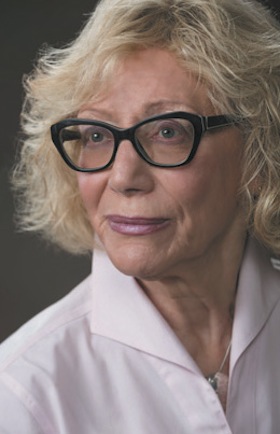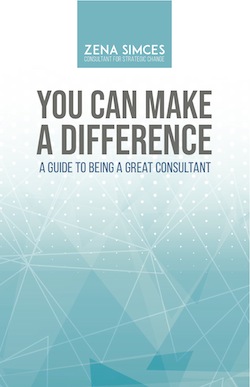Vancouver-based consultant Zena Simces’ You Can Make a Difference: A Guide to Being a Great Consultant(Tellwell Talent, 2020) is an informative, concise and useful primer for anyone considering this career path – or, really, anyone who works with diverse individuals or groups.

Based on knowledge gleaned from 30-plus years of experience working with a wide range of clients, as well as other research, You Can Make a Difference is what its title says, a guide to being an effective consultant. But it also is kind of a guide for how to be a good person and interact well with others. As Simces notes in the chapter on “Upholding Ethical Standards”: “My parents (who were in the grocery business) shaped me as a person and as a consultant. Their motto was to treat people the way I want to be treated.”
Perhaps now, in the context of ethics and family, I should mention that Simces is a longtime family friend. While I don’t think that this fact has influenced my opinions, it is interesting that, more than once in her book – starting with the first chapter – Simces discusses the need for consultants to be aware of things like unconscious bias and to try and mitigate their impacts.
“Knowing your strengths and weaknesses is important,” she writes. “We all struggle with self-awareness, but effective consultants recognize their biases and how to address them. They are natural self-starters and strive for excellence in all that they do, so they are aware of their blind spots and work to improve in areas they are weak.”
The book is full of practical advice like this – not earth-shattering insights but valuable information, collected into one easy-to-read volume of about 100 pages.
You Can Make a Difference is divided into two main parts. The first section takes readers through how to become a consultant, including consideration of whether that’s really the right career path for them. The second section highlights the main skills needed to do the job well. The four-page selected bibliography offers a start for readers who want to dive into the topic more deeply.
The two-and-a-half-page foreword begins with an example from Simces’ career – an instance when things did not go as planned, at least initially.
“While I have learned much from my successes, ‘failures’ like this one offer me the opportunity to learn and grow, which is essential,” she writes. “Being a successful consultant does not only involve substantive knowledge and technical skills, but also ‘soft skills,’ such as relationship-building, listening, communication and leadership. This combination allows a consultant to more efficiently and thoroughly achieve his or her clients’ goals.”
As she notes, these abilities, in reality, are “too important to be called ‘soft’ skills and have become the essence of what is required to be a great consultant. In fact, the Business Council of Canada’s Skills Survey (2018), which is based on responses from 95 of Canada’s largest companies, lists soft skills such as collaboration, communication, problem-solving, analytical capabilities and resiliency as top priorities for entry-level hires. Companies also valued these soft skills for mid-level employees.”
 This is another example of why Simces’ book also would be of interest to people who aren’t necessarily wanting to become a consultant. And that she starts her book with sharing how she learned from a misstep illustrates another of her points that would be beneficial to anyone, not just consultants – that it’s OK to “show some vulnerability. In fact, it takes courage to show vulnerability, and it takes strength to redirect to find a better solution. This can contribute to greater confidence between you and your client.” Or any relationship.
This is another example of why Simces’ book also would be of interest to people who aren’t necessarily wanting to become a consultant. And that she starts her book with sharing how she learned from a misstep illustrates another of her points that would be beneficial to anyone, not just consultants – that it’s OK to “show some vulnerability. In fact, it takes courage to show vulnerability, and it takes strength to redirect to find a better solution. This can contribute to greater confidence between you and your client.” Or any relationship.
Unlike other books of this kind, Simces doesn’t give multiple examples or long stories to help drive home or explain a point. She gives one – and short ones at that – and moves on, which I appreciated. She trusts readers’ intelligence and doesn’t fill pages with unnecessary or ego-inflating narratives. Each chapter ends with a summary of the ideas therein and, in the second section, each chapter also includes a list of key tips covered. While this may seem like overkill, I found it helpful, especially when wanting to quickly find the details about something I only semi-recalled reading. I could see the tips or summaries making the book an accessible reference tool to have on your shelf or computer desktop long after having read it.
Whether or not You Can Make a Difference translates into your being able to make a difference in the world as a consultant, I can’t say, but it gives anyone considering this career path a solid framework for trying to do so. And its lessons and observations are applicable beyond the work setting. We could all use a gentle reminder on how to build trust in relationships, to have the courage to admit what we don’t know, to be flexible and open to change, and other such life, never mind consulting, skills.
